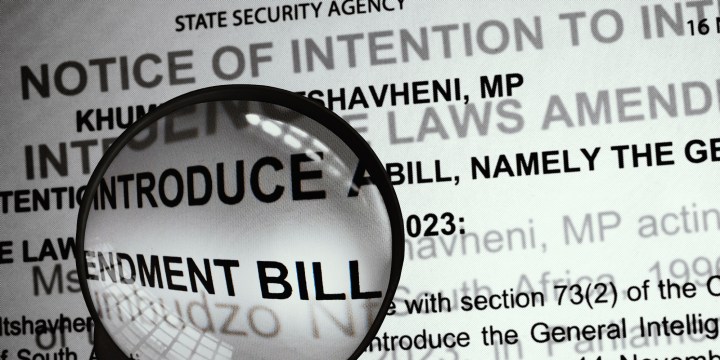PARLIAMENT
Wavering hostile interests definition, security threats signal possible overreach in state intelligence legislation

The General Intelligence Laws Amendment Bill is now before MPs, but from what State Security Agency officials told legislators much seems unresolved — like defining hostile interests threatening national security. Indications on Wednesday were this would be left to ministerial regulations — away from parliamentary scrutiny.
On her second last day in office, State Security Agency (SSA) Director-General Thembisile Majola had an easy time on Wednesday before the parliamentary ad hoc committee on the General Intelligence Laws Amendment Bill, or Gilab.
“Everyone is happy we reached this point a year later,” she said after committee chairperson Jerome Maake had asked whether there was any input.
But sometimes it’s not what is said, but what’s left unsaid. Sometimes it’s in the body language, and breach of the usually shallow protocols that have crept into parliamentary proceedings in recent years.

State Security Agency (SSA) Director-General Thembisile Majola 19 September 2017. (Photo: Dean Calma / IAEA / Flickr)
It would have been practice for Majola to sit alongside her political boss Minister in the Presidency Khumbudzo Ntshavheni. She didn’t, but instead took a seat almost on the other side of the horseshoe table in committee room S35. That’s about as far away as possible, signalling perhaps the at best chilly relationship between DG and minister.
Ntshavheni slipped out around 8.30am to attend cabinet; the committee meeting lasted another 20 minutes or so. It’s a far cry from the four hours set aside on the programme, but only DA MP Dianne Kohler Barnard had any questions.

Minister Khumbudzo Ntshavheni, on 29 June 2023 in Kempton Park, South Africa. (Photo: Gallo Images/OJ Koloti)
Where exactly was the definition of hostile interests? “I couldn’t find a definition. Could you show me?” she asked.
It turns out this apparently was still work in progress and subject to deliberations. “We grouped all those acts we consider threats to national security together under hostile acts,” came the explanation from the SSA lawyer Zoyisile Mshunqane, also citing subversion, for example.
Earlier SSA General Manager Elijah Luvhengo told MPs much would be in regulations in place within 24 months after the law takes effect.
Of course, regulations are the sole discretion of a minister, and generally do not come to Parliament for scrutiny and endorsement. This means the executive has a wide-ranging, unchecked discretion — particularly in the absence of clear, precise definitions.
On Wednesday no questions were asked why, or exactly when, in the executive law-making processes the proposed vetting of non-governmental organisations, churches and others had disappeared from the Bill. Nor were questions asked whether this version of the draft law was a cabinet-approved Bill like the May 2023 version with the provisions on vetting of NGOs, churches and others.
Speaking on the sidelines of the ad hoc committee meeting, Kohler Barnard said she was very interested in who was behind those civil society vetting proposals and how these were introduced in the first place. “This draconian measure has caused completely unnecessary panic,” she added.
Essentially the draft legislation does what was recommended as far back as the 2018 high panel SSA review — splitting domestic and foreign intelligence into separate branches.
And not much more, except reestablishing the spook training academy under the domestic intelligence agency and ensuring regulations were issued to govern the intelligence inspector general’s term of office and security clearance prerequisite. Also included is a mechanism for the bulk interception that the Constitutional Court had ruled invalid — now with a judge and two bulk interception experts. It’s not quite clear what such an expert would be.
No concrete steps seem to have been taken to address the concerns of corruption, financial malfeasance and maladministration ventilated before the Zondo commission into State Capture.
National security
Crucially, Gilab significantly extends the definition of what is a threat to national security in terms of numbers — now 11, or double the previous — and in reach. Included as national security threats are “any activity that seeks to harm the advancement and promotion of equality and equitable access to opportunities by all South Africans” and “any activity that seeks to harm the advancement and promotion of peace and harmony and freedom from fear and want for South Africans”. The qualifier that this did not extend to lawful protest seems inadequate to ensure civil rights protection.
The Gilab ad hoc committee — most members also serve in the parliamentary Joint Standing Committee on Intelligence (JSCI) — started its work in earnest last week by introducing the possibility — unprecedented — of closing meetings in the law-making process if the SSA or anyone else requested.
Read more in Daily Maverick: Lawmaking behind closed doors a possibility as new intelligence Bill processed
It has a tight three-month deadline in no small part due to delays in properly tabling the draft legislation. While a version was sent to Parliament under Joint Rule 159 — it’s giving lawmakers a heads up so they can plan their schedules — Gilab was not officially tabled in the national legislature until mid-November. Parliament’s record of work, the Announcements, Tablings and Committee Reports (ATC) of 17 November showed the Bill was now properly tabled.
MPs had waited for the executive Bill rather than pursuing their own committee draft law as indicated during the May SSA Budget vote debate.
Following Wednesday’s 52-minute meeting, the next to hear from, among others, the bugging judge who authorises wiretaps, is on Tuesday. It would allow those Gilab ad hoc committee MPs who also are in the JSCI to work on finalising the JSCI annual report — it’s six months past the statutory annual May deadline. DM

















 Become an Insider
Become an Insider
Comments - Please login in order to comment.